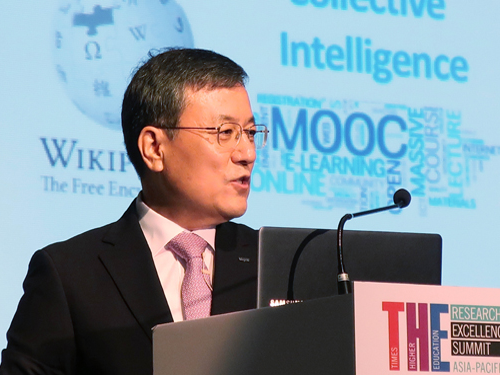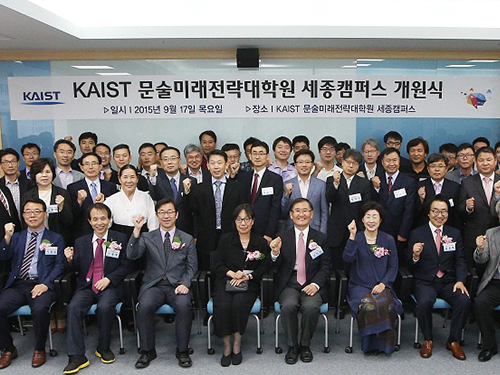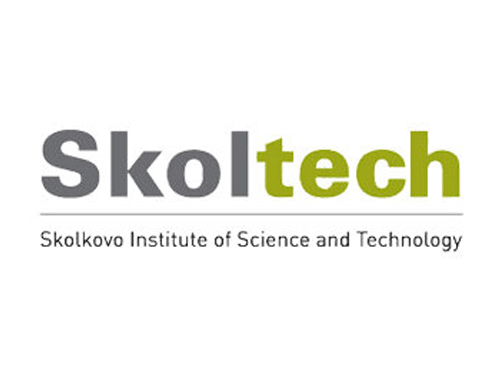MIT
-
 Reform of Universities Key in the Wake of the 4th Industrial Revolution
(President Shin makes a keynote speech at the Times Higher Education Research Excellence Summit held in Taiwan on July 4.)
KAIST President Sung-Chul Shin stressed that innovations in education, research, and technology commercialization of universities are critical for responding to the transformations that the Fourth Industrial Revolution will bring about.
In his keynote speech at the Times Higher Education Research Excellence Summit held in Taiwan on July 4, he cited connectivity, superintelligence, and convergence in science and technology as three components the Fourth Industrial Revolution will pierce, saying the speed and breadth of the transformation will be beyond our imagination. He also presented megatrends in science and technology in the years to come and how KAIST is addressing the challenges and opportunities.
“It is imperative to foster creative young talents fluent in convergence, collaboration, and communication skills in the new era. To this end, we need to focus on whole brain education by enhancing basic education in science and engineering plus humanities and social studies,” he stressed. He also presented a Non-Departmental Education Track, which KAIST plans to implement from next semester. The track, designed to prepare students for the new industrial era, will focus on whole brain education including entrepreneurship and leadership education during the undergraduate period.
He also emphasized an effective new teaching methodology. “We need to develop various new teaching methods. The paradigm should shift from lecturer-centered to student-centered. KAIST is revising our curriculum to facilitate team-based, project-based learning and flipped learning,” he explained.
President Shin also pointed out that the educational goals for the next generation should be to sustain the value of people’s own thoughtfulness, wisdom, emotion, and caring against the advent of a new tribe of AI, dubbed Robo Sapiens. “Those traits add undeniable educational value that we should continue to pursue even in the era of Robo Sapiens,” he added.
As for research innovation, he emphasized inter- and multi-disciplinary collaborative research. “Especially, in addressing pressing global issues and big science, international collaboration will be very effective and crucial,” he said.
At the summit, convergence research projects currently underway at KAIST using emerging technologies such as the smart mobile healthcare project, Dr, M; the humanoid robot, HUBO; and AI drone swarms drew lots of attention from the participants, even receiving proposals to join the projects as collaborators.
In the new era, according to Shin, technology commercialization at universities will emerge as a hub of R&DB. Citing that KAIST has long been a draw for startups, he noted that KAIST has also set a high value on entrepreneurship education including social entrepreneurship and startups.
He continued, “The Korean government is making every effort to harness the challenges and opportunities of the Fourth Industrial Revolution by creating a new economic growth engine. For the success of the government initiative, universities should also respond to make innovations commensurate with the changing needs and challenges. KAIST will take the lead in this new initiative for making a new future.”
2017.07.06 View 8610
Reform of Universities Key in the Wake of the 4th Industrial Revolution
(President Shin makes a keynote speech at the Times Higher Education Research Excellence Summit held in Taiwan on July 4.)
KAIST President Sung-Chul Shin stressed that innovations in education, research, and technology commercialization of universities are critical for responding to the transformations that the Fourth Industrial Revolution will bring about.
In his keynote speech at the Times Higher Education Research Excellence Summit held in Taiwan on July 4, he cited connectivity, superintelligence, and convergence in science and technology as three components the Fourth Industrial Revolution will pierce, saying the speed and breadth of the transformation will be beyond our imagination. He also presented megatrends in science and technology in the years to come and how KAIST is addressing the challenges and opportunities.
“It is imperative to foster creative young talents fluent in convergence, collaboration, and communication skills in the new era. To this end, we need to focus on whole brain education by enhancing basic education in science and engineering plus humanities and social studies,” he stressed. He also presented a Non-Departmental Education Track, which KAIST plans to implement from next semester. The track, designed to prepare students for the new industrial era, will focus on whole brain education including entrepreneurship and leadership education during the undergraduate period.
He also emphasized an effective new teaching methodology. “We need to develop various new teaching methods. The paradigm should shift from lecturer-centered to student-centered. KAIST is revising our curriculum to facilitate team-based, project-based learning and flipped learning,” he explained.
President Shin also pointed out that the educational goals for the next generation should be to sustain the value of people’s own thoughtfulness, wisdom, emotion, and caring against the advent of a new tribe of AI, dubbed Robo Sapiens. “Those traits add undeniable educational value that we should continue to pursue even in the era of Robo Sapiens,” he added.
As for research innovation, he emphasized inter- and multi-disciplinary collaborative research. “Especially, in addressing pressing global issues and big science, international collaboration will be very effective and crucial,” he said.
At the summit, convergence research projects currently underway at KAIST using emerging technologies such as the smart mobile healthcare project, Dr, M; the humanoid robot, HUBO; and AI drone swarms drew lots of attention from the participants, even receiving proposals to join the projects as collaborators.
In the new era, according to Shin, technology commercialization at universities will emerge as a hub of R&DB. Citing that KAIST has long been a draw for startups, he noted that KAIST has also set a high value on entrepreneurship education including social entrepreneurship and startups.
He continued, “The Korean government is making every effort to harness the challenges and opportunities of the Fourth Industrial Revolution by creating a new economic growth engine. For the success of the government initiative, universities should also respond to make innovations commensurate with the changing needs and challenges. KAIST will take the lead in this new initiative for making a new future.”
2017.07.06 View 8610 -
 Moon Soul Graduate School of Future Strategy at KAIST Creates the Next Generation Open Forum 2045
Open forums for envisioning the next 30 years for Korea from the perspective of young people will be held in five metropolitan cities in Korea. Organized by KAIST and hosted by the Ministry of Science, ICT and Future Planning and the Committee for the 70th Anniversary of Korean Liberation, the Next Generation Open Forum 2045 invites young people to shape the future image of Korea for the upcoming 100th anniversary of Korean liberation. It will start off with its first event on September 22 in the Millennium Hall of Konkuk University in Seoul.
In this event, a panel and invited guests will discuss employment issues with a view to ameliorating problems prevalent in the society. A robotics scientist, Dr. JK Han will address the impact of robot automation on the job issue as a keynote speaker, and a performance featuring human-size robot actor will follow his talk to celebrate the opening of the event.
Invited guests can actively participate in the discussion by suggesting their opinions on job issue of the future and by voting on their smartphone apps during the event. Every opinion conveyed during the discussion will be printed and put in a time capsule, which will be opened in 2045 for the celebration of 100th anniversary of Korean liberation.
The Moon Soul Graduate School of Future Strategy of KAIST will organize events in five cities including Daegu, Daejeon, Busan, and Gwangju with topics including education, science and technology, unification diplomacy, and culture. The event will end with a symposium held in Seoul. Perspective applicants can apply for free to the Next Generation Open Forum 2045 on the official website of the Committee for the 70th Anniversary of Korean Liberation.
2015.09.22 View 5601
Moon Soul Graduate School of Future Strategy at KAIST Creates the Next Generation Open Forum 2045
Open forums for envisioning the next 30 years for Korea from the perspective of young people will be held in five metropolitan cities in Korea. Organized by KAIST and hosted by the Ministry of Science, ICT and Future Planning and the Committee for the 70th Anniversary of Korean Liberation, the Next Generation Open Forum 2045 invites young people to shape the future image of Korea for the upcoming 100th anniversary of Korean liberation. It will start off with its first event on September 22 in the Millennium Hall of Konkuk University in Seoul.
In this event, a panel and invited guests will discuss employment issues with a view to ameliorating problems prevalent in the society. A robotics scientist, Dr. JK Han will address the impact of robot automation on the job issue as a keynote speaker, and a performance featuring human-size robot actor will follow his talk to celebrate the opening of the event.
Invited guests can actively participate in the discussion by suggesting their opinions on job issue of the future and by voting on their smartphone apps during the event. Every opinion conveyed during the discussion will be printed and put in a time capsule, which will be opened in 2045 for the celebration of 100th anniversary of Korean liberation.
The Moon Soul Graduate School of Future Strategy of KAIST will organize events in five cities including Daegu, Daejeon, Busan, and Gwangju with topics including education, science and technology, unification diplomacy, and culture. The event will end with a symposium held in Seoul. Perspective applicants can apply for free to the Next Generation Open Forum 2045 on the official website of the Committee for the 70th Anniversary of Korean Liberation.
2015.09.22 View 5601 -
 The MIT Skoltech Initiative Report identifies KAIST as one of the core group of emerging leaders for academic entrepreneurship and innovation
The Massachusetts Institute of Technology (MIT) Skoltech Initiative was established in 2011 to support MIT’s multi-year collaboration in building the Skolkovo Institute of Science and Technology (Skoltech), a private graduate research university in Skolkovo, Russia.
Recently, the office of the MIT Skoltech Initiative has published a benchmark report conducted from 2012 to 2014 by Dr. Ruth Graham, an internationally recognized leading consultant for engineering education and research as well as academic technology-driven entrepreneurship, under the guidance of MIT professors and the Center for Entrepreneurship and Innovation at the MIT Skoltech Initiative.
The report identified more than 200 institutions as the world’s most highly-regarded entrepreneurial universities and characterized the approach taken by them to build university-based ecosystems for entrepreneurship and innovation (E&I).
Among the top-ranked institutions, the report mentioned an emerging group of leaders (EGLs) that are “located within more challenging environments but establishing strong entrepreneurship and innovation profiles and reputations.” The report named, in particular, five universities, KAIST (Korea), Technion (Israel), Aalto University (Finland), the University of Michigan (US), and the University of Auckland (NZ), as the core group of the EGLs.
This benchmarking study was written to highlight key strategies and features associated with well-regarded university E&I transformations within more challenging environments and to address barriers and limits faced by the EGLs, thereby providing a good model to other universities wishing to make similar changes.
Through an in-depth case study of a small group of emerging universities, the report concluded that three major components play a critical role in the development of institutional E&I capacity and the growth of ecosystems for E&I:
Component 1: Inclusive grassroots community of E&I engagement across university populations and regional community;
Component 2: Strength in industry-funded research and licensing of university-owned technology; and
Component 3: University E&I agenda reflected in its policies, mission, budget allocations, incentives and curriculum
For more details, please visit the link below:
http://web.mit.edu/sktech/sktech-program/entrepreneurship-innovation/benchmark.html
2014.08.20 View 9612
The MIT Skoltech Initiative Report identifies KAIST as one of the core group of emerging leaders for academic entrepreneurship and innovation
The Massachusetts Institute of Technology (MIT) Skoltech Initiative was established in 2011 to support MIT’s multi-year collaboration in building the Skolkovo Institute of Science and Technology (Skoltech), a private graduate research university in Skolkovo, Russia.
Recently, the office of the MIT Skoltech Initiative has published a benchmark report conducted from 2012 to 2014 by Dr. Ruth Graham, an internationally recognized leading consultant for engineering education and research as well as academic technology-driven entrepreneurship, under the guidance of MIT professors and the Center for Entrepreneurship and Innovation at the MIT Skoltech Initiative.
The report identified more than 200 institutions as the world’s most highly-regarded entrepreneurial universities and characterized the approach taken by them to build university-based ecosystems for entrepreneurship and innovation (E&I).
Among the top-ranked institutions, the report mentioned an emerging group of leaders (EGLs) that are “located within more challenging environments but establishing strong entrepreneurship and innovation profiles and reputations.” The report named, in particular, five universities, KAIST (Korea), Technion (Israel), Aalto University (Finland), the University of Michigan (US), and the University of Auckland (NZ), as the core group of the EGLs.
This benchmarking study was written to highlight key strategies and features associated with well-regarded university E&I transformations within more challenging environments and to address barriers and limits faced by the EGLs, thereby providing a good model to other universities wishing to make similar changes.
Through an in-depth case study of a small group of emerging universities, the report concluded that three major components play a critical role in the development of institutional E&I capacity and the growth of ecosystems for E&I:
Component 1: Inclusive grassroots community of E&I engagement across university populations and regional community;
Component 2: Strength in industry-funded research and licensing of university-owned technology; and
Component 3: University E&I agenda reflected in its policies, mission, budget allocations, incentives and curriculum
For more details, please visit the link below:
http://web.mit.edu/sktech/sktech-program/entrepreneurship-innovation/benchmark.html
2014.08.20 View 9612